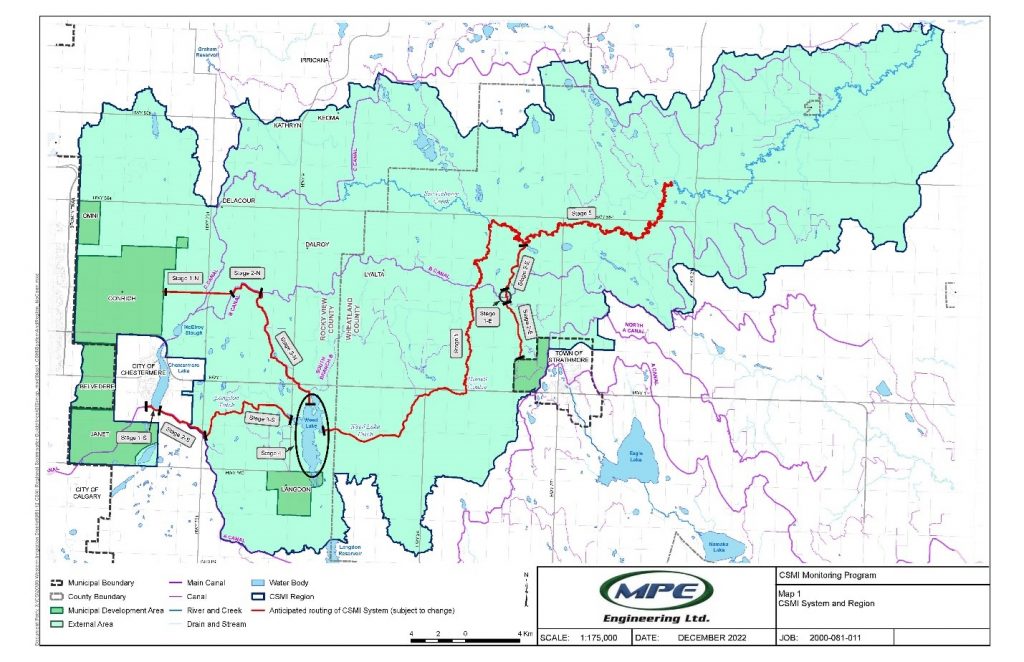There is a large tract of land spanning the Eastern edge of the City of Calgary, the Town of Strathmore and Rocky View County where there are limited natural drainage courses to effectively transfer stormwater. Ongoing development in these communities, which are adjacent to and surrounding the Western Irrigation District (WID) irrigation system, has been accelerating stormwater management challenges in the area. This includes creating ongoing maintenance and water quality challenges for the WID and limiting the available options for new developers to safely move runoff away from their properties.
There is a need to develop a long term, sustainable solution for stormwater management that facilitates municipalities to grow and develop land, while maintaining water quality in the irrigation system that supports a vibrant agricultural economy and the long-term health of nearby water resources.
In 2012, the Western Irrigation District responded to this need and spearheaded an effort to bring together five partner municipalities to develop a regional stormwater solution, now known as the Co-operative Stormwater Management Initiative (CSMI).
Stormwater is water that flows over land during rainfall and snowmelt events, also called runoff. Stormwater management systems may store, move, and treat stormwater runoff to minimize negative effects to communities and the natural environment. Development decreases the natural landscape’s ability to absorb some of the runoff and remove pollutants before it drains off the landscapes, often increasing the need for stormwater management systems in developed areas. Impervious surfaces like roads and parking lots prevent the water from soaking into the ground, increasing runoff rates and accumulation of pollutants in the stormwater runoff. This increases the risk of flooding while water quality of downstream water bodies deteriorates as the water eventually drains to surface or groundwater outlets [1].
Recognizing a shared responsibility for the system’s current challenges, the municipalities surrounding the WID have come together as the CSMI to proactively collaborate in developing sustainable stormwater solutions that will accommodate equally the needs of all interested parties and the environment.
In winter 2018, the CSMI Master Stormwater Agreement was signed by all six partners, committing the group to proceed with development of subsequent Agreements for Development, Management, and Use of the stormwater system. These Agreements, which must be ratified by all partners to take effect, are essential for defining how the CSMI system will be built, managed, and used by the partners. Partners intend to complete these Agreements by February 2019 as per the CSMI Master Stormwater Agreement.
Stormwater drainage solutions are needed for the CSMI region because there are limited natural drainage courses to effectively transfer stormwater.
After several years of collaborating, innovating and completing engineering assessments to determine how to collect and treat stormwater before it is returned to rivers, it was decided that the most feasible option for developing a regional stormwater system is an “out of canal” option. “Out of canal” means that water is kept out of the WID irrigation canals and flows through an independent system. This solution combines existing and new infrastructure to divert stormwater runoff away from the irrigation system, treat it as necessary through stormwater Best Management Practices (BMPs), and eventually release it to a natural water course.
Through development and implementation of the CSMI System, municipal and irrigation sectors are working together and sharing resources to develop a mutually beneficial solution. The shared solution will achieve a sustainable stormwater system that:
In addition to the above stormwater benefits, the CSMI is a unique project that will provide a process for ongoing collaboration between municipalities and the irrigation district for decades to come. Water flows across political boundaries, bringing people and organizations together to manage one of our most valuable resources. The relationships built throughout this collaborative process will support continued economic growth, a vibrant agricultural economy, and the long-term health of regional water resources.
The map below shows the boundaries of the areas that were studied when determining the potential needs and benefits of the CSMI.
The boundaries shown on the map are conceptual and subject to change once the CSMI partners begin engagement and consultation with specific landowners in the CSMI region, complete the final design and apply for regulatory approval. Click to clarify and enlarge the photo.

1. AUMA, A. U. (n.d.). Stormwater. Retrieved from Alberta Urban Municipalities Association: https://auma.ca/advocacy-services/programs-initiatives/water-management/watershed-management/stormwater
We provide Canadian educational resources on water practices to promote conservation and sustainability. Our team crafts current and relevant content, while encouraging feedback and engagement.
The Canada WaterPortal is a registered charity, #807121876RR0001
We recognize and respect the sovereignty of the Indigenous Peoples and communities on whose land our work takes place.
© 2025 All Rights Reserved.